Who knew what a fabulous resource elephant poo could be? Non smelly, full of lovely rich fibres and completely abundant, it is a top-tastic recyclable resource. We had a lovely hour or so in between death-defying adventures (tigers and crocodiles) wandering around this splendid place, learning all about this woefully undervalued material and its literary uses. So here, my friends, is a brief lesson in how to make elephant poo poo paper…
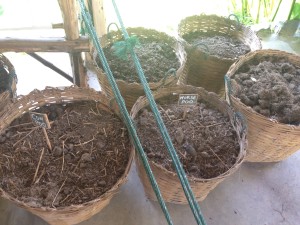 First, get your common or garden elephant poop and let it dry out a bit. It
First, get your common or garden elephant poop and let it dry out a bit. It 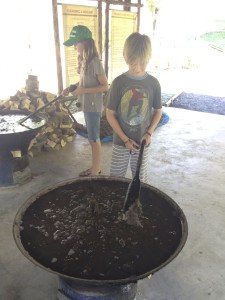 won’t smell, and will be eminently touchable once its aired out a bit. Then wash it through a few times to get rid of the pebbles, dirt, mud and leaves, so all you are left with is this lovely ‘clean’ fibre.
won’t smell, and will be eminently touchable once its aired out a bit. Then wash it through a few times to get rid of the pebbles, dirt, mud and leaves, so all you are left with is this lovely ‘clean’ fibre.
Stick this is a pot and boil it up for 4-6 hours to make these fibres bacteria free, beautifully soft and mushy. Just like this delicious slurry just below. 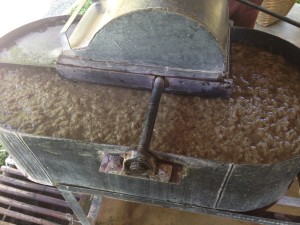 After this, it gets even richer – oh yes. We blend the poo pulp fibres with any other handy non-wood fibres that we can find – corn stalks, pineapple husks, banana tree trunks, mulberry bark, hay etc. This turns our slurry into a delicious stew, to which non toxic food coloring can be added.
After this, it gets even richer – oh yes. We blend the poo pulp fibres with any other handy non-wood fibres that we can find – corn stalks, pineapple husks, banana tree trunks, mulberry bark, hay etc. This turns our slurry into a delicious stew, to which non toxic food coloring can be added.
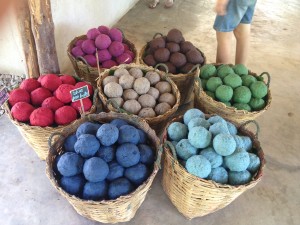 Once this is done, we can take the pulp from the mixing reservoir, and turn it into lovely round balls. Aren’t they pretty? The process after this of turning balls to paper, is called screening. This has pretty much been the same since the invention of paper in China in 140AD. We take the pulp balls and submerge them into a basin of water, where there is already a submerged screen. As the pulp fills with water, we can spread it evenly across the screen, and then place it in the lovely Thai sun to dry.
Once this is done, we can take the pulp from the mixing reservoir, and turn it into lovely round balls. Aren’t they pretty? The process after this of turning balls to paper, is called screening. This has pretty much been the same since the invention of paper in China in 140AD. We take the pulp balls and submerge them into a basin of water, where there is already a submerged screen. As the pulp fills with water, we can spread it evenly across the screen, and then place it in the lovely Thai sun to dry.
Once it is dry, the whole sheet of paper can easily be lifted off the screen. Glorious, clean, recycled elephant poo! Isn’t it lovely?
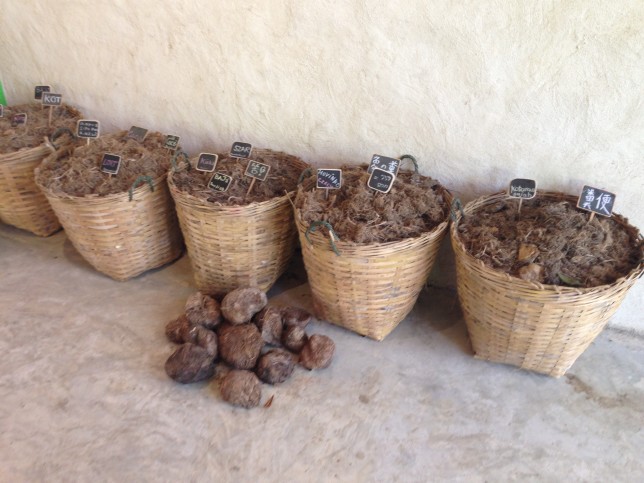
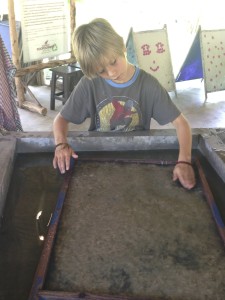
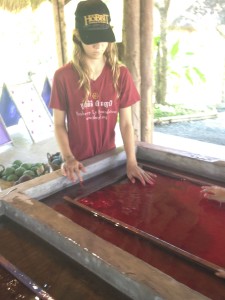

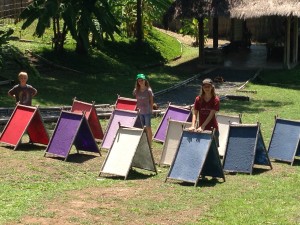
Interesting story, Gerry and exciting experience!
I imagine how fascinated tour kids might be.
One day, should we read the memories of your adventures around the globe, on poo poo paper?